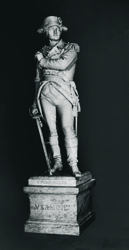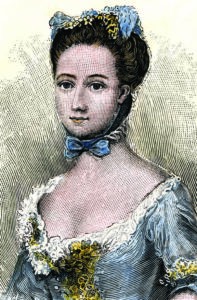 MHQ recently chatted with Willard Sterne Randall, whose new book, Ethan Allen: His Life and Times, cuts through the hagiography surrounding the Revolutionary War patriot and leader of the Green Mountain Boys.
MHQ recently chatted with Willard Sterne Randall, whose new book, Ethan Allen: His Life and Times, cuts through the hagiography surrounding the Revolutionary War patriot and leader of the Green Mountain Boys.
What’s the biggest myth about Allen?
That he was a hard-drinking, hard-swearing, impetuous, reckless outlaw, part Davy Crockett, part Paul Bunyan, and two parts Jack Daniel’s. This frontier ruffian image stems from the fact that, before the war, he was outlawed by the royal Assembly of New York, many of whose members were trying to dispossess settlers in present-day Vermont and resell them lands they’d bought from New Hampshire’s governor. Allen, supported by 29 settlements, formed the Green Mountain Boys and fended off New York posses for five years until their independence movement became subsumed in the larger revolution.
What was Allen’s greatest success as a military leader?
On May 10, 1775, he surprised a British garrison at Fort Ticonderoga, then took a second key British post at Crown Point. By seizing 200 desperately needed cannons, he provided George Washington the ordnance to fight a state-of-the-art war and drive the British out of Boston. By quickly taking control of Lake Champlain, along the traditional invasion route from Canada, Allen safeguarded New York and New England from counterattack for a full year.
Why did the American invasion of Canada in the fall of 1775 fail?
Ethan Allen and Benedict Arnold, who helped Allen lead the successful Lake Champlain campaign, shared Washington’s vision of seizing Canada, defended by only 700 regulars, with a giant pincers movement before the British could reinforce it from England. Many leaders in New York and Vermont did not share their sense of timing and dreaded British reprisals. Major General Philip Schuyler, in command of the Northern Department, owned vast estates on the Mohawk River and stalled the invasion while he tried to pacify the Iroquois. He saw Allen as an outlaw and worked to have him voted out of office by Vermonters who also feared reprisals. Claiming ill health, Schuyler lost precious weeks. He was replaced by Brigadier General Richard Montgomery, a former British officer who insisted on a 53-day textbook siege of Fort St. John on the Canadian border, allowing Canada’s governor general, Sir Guy Carleton, time to recruit loyalists and Indians. Both Allen and Arnold, racing against a Canadian winter, were betrayed by fellow officers who deprived them of sufficient forces to capture Montreal and Quebec.





